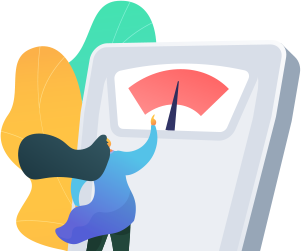Our Perfect Essay Writers Are Always at Your Service!

Difference between Human Intelligence and Artificial Intelligence
The rapid advancement of computer artificial intelligence (AI) has aroused the mixed reactions from the public with a fear that they might soon be rendered jobless by the technologies like robots and driverless cars. On the other hand, most people are fascinated by their ability to mimic human minds and their entertainment, especially when it comes to gaming. The question that lingers in the minds of many of individuals regarding computer artificial intelligence is related to how smart they are. People as well ask if they could outwit human intelligence due to their optimal performance, accuracy, and precision as compared to individual performances being dotted with numerous errors and longer delivery times. The case in point is in the year 2011 when Watson, a computer with artificial intelligence, won the famous television quiz show, Jeopardy, by beating two humans, who had been the champions;surprisingly, it had not been connected to the Internet (Sautoy 2012). Such scenarios are the ones that make many people question whether the AI, through its programming, has surpassed human intelligence. Computer artificial intelligence can perform more functions than its human counterparts. While AI programming has eliminated most of the human errors, it has never surpassed a human understanding as it is developed and programmed by human beings.
In the year 1956, the academic conference on artificial intelligence was hosted by John McCarthy to try brainstorming a possibility of machines that are able to think and, to some point, start to compete with human intelligence (Adams 2017). The agenda of the conference had been inspired by the earlier studies into the subject of artificial intelligence, when Alan Turing, a British mathematician, presented the seminal paper on ‘Computing, Machinery, and Intelligence,’ in 1950 (Sharkey 2012). The article explored a possibility of machines to think as human beings. It was a move that made different scientists strive to create the devices that were capable of competitive human intelligence. The ability to develop computer systems and program them to perform specific tasks that require human intelligence, like decision making, translation between languages, visual perception, and speech recognition is what referred to as artificial intelligence (Antunes & Pinto 2011). Human intelligence, on the other hand, is the functions of the individual’s mind that are gradually developed by the capabilities to learn from past experiences and interactions with surrounding persons and the environment, hence, having an ability to transform his or her setting with the acquired knowledge.
Our Advantages
We have gained an unrivaled reputation, as we provide a large number of students
with expert assistance in doing their assignments

300 words per page

Plagiarism-free and AI-free content

24/7 customer support

VIP services
The distinction must be drawn between artificial intelligence and human intelligence to gain more insight, on which of the two ones is superior. Human intelligence uses its cognitive process to adapt to an environment. Thus, it is an outcome of a natural system that is ever evolving. Artificial intelligence, on the other hand, pays attention to outlining machines that can perform as human beings. Besides, it means it is created and controlled by people through the inbuilt computer programs (Russell & Norvig 2016). There is a difference between an actual position and its equivalent model, thus, indicating that human intelligence can be compared to a specimen of programmed circumstances, and the AI only tries to imitate or model it. When it comes to the storage of information, artificial intelligence comes with an inbuilt scientific memory, while the human one uses a schema and content memory to store data. Finally, when drawing the distinction of the two ones, regarding size, the following fact is obvious. The human intelligence is bigger than the artificial one, which is temporary, thus, making the human intelligence to be more dependable. It occurs even though AI commits fewer errors than human intelligence in most cases.
The Turing Test
Alan Turing has suggested some tests and a set of guidelines. They would be benchmarked to determine if a machine was capable of thinking, so as to realize the complete success of artificial intelligence. These checks later came to be known as the Turing Test. Turing viewed the success of AI as being able to build a machine that can sufficiently imitate a human being to the point, whereby it would be impossible to tell the difference between those two ones. Therefore, all the suspicions would have been successfully eliminated. The benchmark was mainly based on communication, whereby AI would be considered the successful moment in the following case. It would not only be able to speak and listen like a human being, but also when it could be able to distinguish, which machine or computer that he or she had communicated. The test was hinged upon an imitation game akin to the Victorian show, a television game with three characters, an interrogator, a man, and a lady (Dodig & Giovagnoli 2013). With the male and the woman secluded from the interrogator, the aim of the latter one was to identify, which of the participants was the lady or the man by getting typewritten replies for the asked questions. In the context of Turing test, one of them would be replaced by a machine. Thus, the interrogator had to determine, which of them had been replaced..
Observable Outcomes of Artificial Intelligence
In the recent years, different devices have been developed with sophisticated computer programs. They have been tested against humans to prove that computers can beat human intelligence using their AI. The most famous one is Watson, a computer using artificial intelligence, which managed to beat two veteran world’s champions on the television quiz show, Jeopardy, back in 2011 (Bostrom 2014). The triumph of Watson signalled a significant success for artificial intelligence. The machine managed to compete with real humans using its installed computer programs; and, just as people, it was not connected to the Internet. There are other intellectual games, like chess, that were used to test artificial intelligence against human one. Considered as one of the most engaging intellectual game, many computer scientists believed that developing a chess-playing machine, which would successfully compete with a real person, would mark the new milestone made by I.
Writing Quality
Make the right choice and get the perfect quality papers
Standard value
(Standard value) The task is being completed by one of our professional writers according to the deadline specified - we make sure the script is handled by an appropriate specialist of the particular field of study.

Premium value
(+10% of the order total amount) This option is for clients who want their order to be quickly assigned to one of our professional writers. The premium quality also means that the final paper will be a subject to additional plagiarism checks, and the client will receive a PDF file with a detailed plagiarism report created by our professional editors.

Supreme value
(+15% of the order total amount) Apart from a “Detailed Plagiarism Check” option, our online agents will try to urgently assign a writer among the top 30 best company writers. Your order becomes of the highest priority for us. If you want your order to be our TOP priority, select this option.

After the years of research and development, IBM successfully developed a type-A chess-playing machine named Deep Blue in 1997, which challenged and defeated Gary Kasparov, the world chess champion of that time (Adams 2017). Other intellectual games that the machine has toppled the best of human minds include Scrabble and Othello. Artificial intelligence is not only the being applied in the gaming industry but also in different other sectors, such as in the smartphone world today with voice-powered personal assistants, including Alexa and Siri. AI is as well redefining the way individuals live their lives today regarding work and entertainment (Constantinescu 2015). Elon Musk, who is one of the biggest fans of artificial intelligence, has through his company, Tesla, pioneered the autonomously powered self-drive vehicles with powerful predictive capabilities, thus, transforming the transport industry (Barat 2015). Robots have taken over production line duties in several factories, while indicating not a successful breakthrough of artificial intelligence but also predicting a promising future for the technology.
Problems of Turing Tests and Artificial Intelligence
Artificial intelligence has made a remarkable progress to the extent of transforming human lives today and making work easier for them. However, the technology still does not come close to meeting the requirements of Turing Test. Its machine champions can successfully imitate all the aspects of a human being for it to be compared to people imagining that they can surpass the human understanding or even develop a mind of their own. Machines can only perform the duties that they have been programmed to do. They cannot in any way originate anything. The humans, on the other hand, are not only able to do whatever they wish without being directed by a computer program. However, they are also capable of originating new concepts and ideas at all times (Moor 2012). There are some notable successes with artificial intelligence considering the teaching models that have been developed. Such templates are determined to instruct the machines to be able to detect the variances of human writing or dialect, as well as voice recognition.
However, it is only through interactions with fellow people that a person can be able to assess their intelligence. However, even if machines and computers pass this test, it does not imply that they understand anything about the interaction. There are numerous cases where the devices have outsmarted their human counterparts given their high levels of accuracy and speed through games or even in daily activities in factories and driving (Sautoy 2012). These scenarios prove the efficiencies and effectiveness of artificial intelligence where the machines and computers show and solve complex problems faster than people. The future of AI is more promising as machines have the potential of beating the own top human intelligence due to their studies, knowledge, and excellent adaptive experience. On the contrary, the answer will always be negative on whether machines can develop their intelligence by themselves. Artificial intelligence is developed and programmed by human mind. Therefore, it can only perform up to the extent that the human intelligence allows them, hence, it is the biggest limitation of artificial intelligence (Emerging Technology from the arXiv 2016). The excellent performance of AI is based on the following fact. The extensive study is usually carried out to point out all the limitations, gaps, and errors that are prone to human knowledge. Therefore, artificial intelligence will be designed and programmed in a way that will eliminate as many mistakes and shortcomings as possible, hence, making the faster and near perfect execution of their assigned tasks.
Our Lifetime Discounts:

Exclusive savings! Save 25% on your ORDER
Get 15% OFF your FIRST ORDER (with the code perfect15) + 10% OFF every order by receiving 300 words/page instead of 275 words/page
Consequences of Artificial Intelligence
Moral Consequences
Given the fact that artificial intelligence can be developed and programmed to execute specific tasks, there are numerous possibilities that are considered to be immoral in the society. Autonomous weapons are AI, which, if found in the wrong hands such as those of terrorists, can be quickly developed and programmed to kill. In many cases, it can cause mass casualties. There are numerous concerns of developing and using killer robots in wars. More recently, the use of drones, which many people fear that they can spark the global arms race to develop artificial intelligence weapons, has as well caused many anxieties (Seibt, N?rskov & Hakli 2014). Moreover, most of the weapons will be designed and programmed to be tough to turn off for them to inflict a maximum damage as humans may find them hard to control.
Legal Consequences
The advancement of artificial intelligence in the areas like autonomous driving or robotic medicine in healthcare will soon create legal implications regarding legal responsibilities, causation, and agency. Currently, there are limited or no legal frameworks that adequately address the situations involving artificial intelligence, thus, affecting the administering of justice (Yang 2013). Many questions appear on who should be responsible when a machine commits a crime remain unanswered. It happened in Switzerland where a robot was arrested for shopping with the purpose of committing random dark-net purchases, like ecstasy pills, as well as a Hungarian passport (‘Artificial intelligence, technology and the future of law’ 2017). However, neither the robot nor its owner was charged. It is still not clear how AI should be regulated when it is acting on its own, outside the control of humans..
Economic Consequences
It is now becoming a common occurrence witnessing artificial intelligence taking over the roles that were performed by people. More factories are replacing their production line workers with robots due to their low costs and effectiveness (Soergel 2017). Many employers are up in arms with labor unions, who are continuously protesting the implications of machines taking over jobs, thus, pushing the rate of unemployment higher.The studies show that one robot had replaced up to 1000 jobs from 1993 to 2007 indicating hundreds of thousands of jobs lost in the US alone during this period (Barat 2015). Another Oxford research warns that up to 47% of Americans risk losing their position due to artificial intelligence in the next two decades. Therefore, there is a need to approach this issue with caution to save many jobs that are at risk (Finn & Scheduling 2010).
Social Consequences
Artificial intelligence is programmed in such a way that it might cause some social rifts thus undermining human relationships in future. Having AI to take over human duties at home like necessary house chores is seen as a move that will lead to the creation of the society. It will be comprised of the individuals that are programmed lazy and irresponsible unaware of what the community expects of them. It has programmed that in future there will be some possibilities for humans to get into relationships with machines. It is the fact that has programmed a lot of resistance claiming that such innovations will be a threat to the families triggering the extinction of a family unit.
Conclusion
It is the fact that artificial intelligence can perform and execute the tasks at optimal levels. The outcomes become not only faster, precise, and accurate as compared to the human counterparts, but also more reliable by a day. The future of artificial intelligence is promising to consider the rate, at which technology is evolving with time, hence, giving it an opportunity to grow and perform at a much higher level than today. However, despite its performance at high speed, there have been some concerns that they might end up to the point, whereby they can surpass human understanding. Computer artificial intelligence can execute more than their human counterparts are able to do. However, AI cannot be beyond human understanding as machines are developed and programmed by human mind. Despite their benefits and advantages to people, as they have remarkably simplified human life, there are some doubts about the risks it possesses in addition to other negative implications brought by robots. Artificial intelligence in the hands of criminals is dangerous. I develop the weapons of mass destruction that can inflict a lot of damages and losses in the society, as well as create robots to mishandle the public’s finances due to poor predictions and decision making leading to losing money. The legal challenges that come with them may result in the culture of impunity understanding that there are little or no regulations to control their actions. Many people may be able to exploit them for executing their selfish ideas at the expense of other people’s rights and still evading the law as they used artificial intelligence. Strict and appropriate measures are at this moment recommended regulating AI to ensure their optimal performance, while at the same time sealing loopholes for exploitation.

